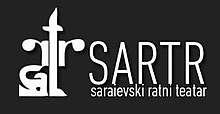Sarajevo War Theatre
The Sarajevo War Theatre (Bosnian: Sarajevski ratni teatar / Сарајевски ратни театар, SARTR) is a theatre in Sarajevo, Bosnia and Herzegovina.[1][2] It was founded on 17 May 1992 on the initiative of Dubravko Bibanović, Gradimir Gojer, Đorđe Mačkić and Safet Plakalo during the infamous Siege of Sarajevo.[3][4] It was a gathering place for theatre professionals and Academy of Performing Arts students for the duration of the war.[5] Today, it is a commercial theatre and the premium experimental showcase in Bosnia and Herzegovina.[6][7] It is one of the venues for the MESS International Theatre Festival and the sole venue for the Open University of Sarajevo.[8]
 Sarajevo War Theatre logo | |
| Address | Gabelina 16, 71000 Sarajevo Bosnia and Herzegovina |
|---|---|
| Coordinates | 43°51′48.78″N 18°24′54.86″E |
| Opened | 17 May 1992 |
| Website | |
| www | |
History
With the start of the Siege of Sarajevo the city's cultural life was dramatically halted. Actors and associates of the three existing professional theatres in Sarajevo, which had ceased all activities at the beginning of the Bosnian war, gathered around the concept of an ad-hoc war-time experimental theatre. After SARTR was established they proceeded to give numerous performances during the four years of siege.[9] The theatre was formed around a grass roots concept of showcasing anti-war pieces that were often directed by students of the Academy of Performing Arts.[10]
In January 1993, SARTR was officially recognised by the Sarajevo City Assembly as a public institution of special significance for the defence of Sarajevo.[11] SARTR's founding director, Safet Plakalo, has often spoken of SARTR as Sarajevo's spiritual weapon against the surrealism of war, summarising its charter in the catch-cry Theatre Against Death.[12] The theatre's first war-time production was Shelter (Bosnian: Sklonište), headlined by acclaimed Bosnian actress Jasna Diklić, which had a theatrical run of 97 showings throughout the siege.[13][14] SARTR was the first Bosnian theatre to leave the country during the war and showcase its productions abroad, visiting the Avignon Festival in 1994.[15]
With the end of the conflict, SARTR continued operating as a public theatre. In 1997 the Sarajevo Canton took over the position of founder. A new team of young theatre professionals, including Nihad Kreševljaković and Aleš Kurt, took over the management positions and started expanding SARTRs programme and reach. Apart from having a professional weekly programme, the theatre still showcases student productions from the Academy of Performing Arts and hosts numerous festivals and socially engaged projects such as the Open University of Sarajevo.[16][17] In 2003 the theatre received the Sixth April Award of Sarajevo - the highest decoration given by the city.[18] Despite limited resources, SARTR is today a successful professional theatre company with a number of international co-productions, appearances and awards under its belt.[19]
References
- "Sarajevski ratni teatar". mks.ks.gov.ba.
- "Sarajevski ratni teatar: Premijera predstave "Narodna drama"". oslobodjenje.ba.
- SARTR, Bosnia and Herzegovina.
- "Sarajevski ratni teatar – SARTR". sarajevo.co.ba.
- "Suradnja sa Akademijom scenskih umjetnosti u Sarajevu". official website.
- SARTR, Bosnia and Herzegovina.
- "Bedem duhovne odbrane Sarajevski ratni teatar SARTR slavi 25. rođendan". klix.ba.
- "Bedem duhovne odbrane Sarajevski ratni teatar SARTR slavi 25. rođendan". klix.ba.
- "SARTR". navigator.ba.
- "Suradnja sa Akademijom scenskih umjetnosti u Sarajevu". official website.
- "Osnovan Sarajevski ratni teatar - SARTR". historija.ba.
- "Kako su Safet Plakalo, Dubravko Bibanović i sarajevski glumci pomogli građanima da ne polude pod granatama". depo.ba.
- "Bedem duhovne odbrane Sarajevski ratni teatar SARTR slavi 25. rođendan". klix.ba.
- "Osnovan Sarajevski ratni teatar - SARTR". historija.ba.
- "Osnovan Sarajevski ratni teatar - SARTR". historija.ba.
- "Sarajevo / Otvoreni univerzitet s ključnim pitanjima: Šta da se radi". Radio Sarajevo.
- "Suradnja sa Akademijom scenskih umjetnosti u Sarajevu". official website.
- "25 godina SARTR-a - fenomena duhovnog otpora Sarajeva". ba.n1info.com.
- ""Narodna drama" Bobana Skerlića premijerno u SARTR-u 27. januara". klix.ba.
External links
Gallery
 Nineteen Eighty-Four in Sarajevo War Theatre, 2013
Nineteen Eighty-Four in Sarajevo War Theatre, 2013